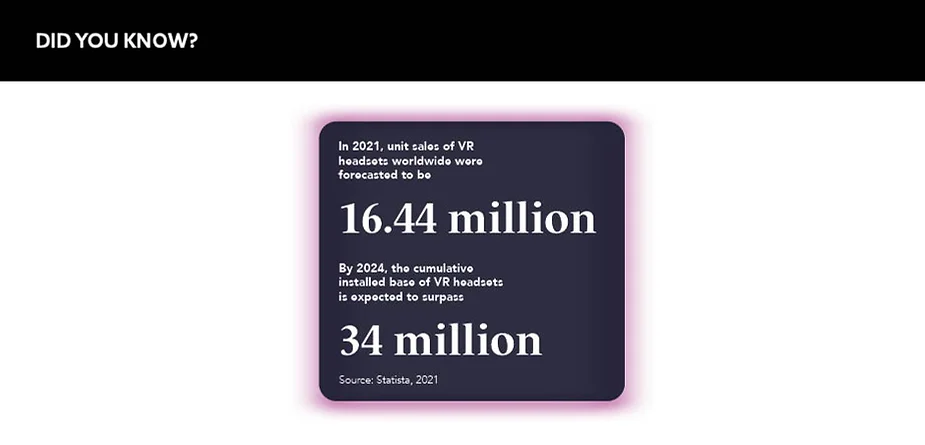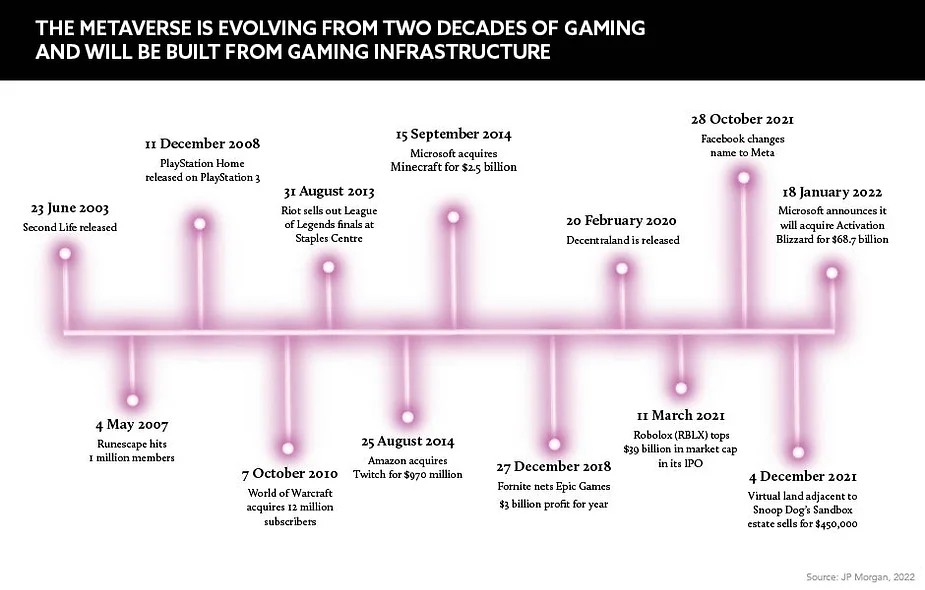The metaverse is creating a persistent buzz, but is this new virtual world worth the hype for the pharmaceutical industry? GOLD explores pharma’s future in the metaverse, untangling the good, the bad and the uncertainties
Words by Isabel O’Brien
On first inspection, Mark Zuckerberg’s vision for the metaverse is a pristine replication of our reality. The look is polished and stylish, and the integration of human beings into the virtual landscape is seamless. But, dig deeper and there is nothing real about the metaverse. From ageless avatars to spotless workspaces, it is nothing short of a simulation.
In a one-hour-17-minute-long YouTube video, Zuckerberg strolls through his vision for this virtual world and explains that people will “work better and achieve more” in the metaverse. Whether that’s because employees won’t be distracted by the calamity of home or office life, they will be less preoccupied by their actual appearances, or something else entirely, is unclear, but is there potential in business, particularly for the pharmaceutical sector, which is keen to keep pushing the boundaries of digital transformation?
Metaverse misconceptions
The flow of emerging technologies and buzzwords is constant, and as one innovation gains understanding and use cases, a new kid takes the proverbial block. A few years ago, it was bitcoin and blockchain that were causing a buzz, not to mention plenty of confusion. The technologies were denounced as devices for executing criminal activity on the dark web, but there are plenty of legal applications for the pairing too. Now metaverses, virtual reality and Web 3.0 are all terms that are being discussed, confused and conflated – and sceptics are raising similar aspersions as to what the metaverse will be used for.
To understand what the metaverse is, it’s important to pinpoint its place in the emerging technologies ecosystem. According to Haider Alleg, Global Head of Digital, Ferring Pharmaceuticals, “the metaverse is aiming to be a new world, a new continent, a new internet”. While Web 3.0 is a concept rooted in who will own and control tomorrow’s internet, focusing on data ownership and trade, the metaverse centres on how users will experience the internet of the future.
The metaverse is aiming to be a new world, a new continent, a new internet
A metaverse is an immersive virtual world that can be accessed via a computer, virtual reality (VR) headset, smartphone – plus contact lenses if future pipelines are to be believed – in which people, often represented by avatars, can interact, have experiences and buy virtual goods or even land using cryptocurrencies. The transactions are kept secure using blockchain networks.
“The idea of the metaverse is that it wants to make our virtual lives more seamlessly integrated with our real ones – for you to be right there with people, no matter how far you are,” says Rahul Avasthy, Lead, Digital Transformation and Experience, Abbott, speaking from the metaverse at Next Pharma Summit’s ‘NEXT Normal: Pharma digital and commercial excellence’ event. Existing metaverses include the at-times-controversial gaming platform VRchat, which allows users to meet in a variety of virtual reality spaces and even create their own.
The metaverse is not Facebook, but Facebook and other technology companies are building metaverses that they hope people will start to adopt and occupy with as much consistency as they currently do the ‘realverse’.
Entering the metaverse
While the metaverse is, in principle, a logical next stage of social interaction by combining emerging technologies in one platform for a totally immersive online experience, for the pharma industry, it is important to take a careful approach to early adoption.
“The destination of the conversation should not be ‘we should be in the metaverse’,” says Alleg. “The metaverse should be a vehicle to take us somewhere. And if we don’t figure what the definition of that emerging experience is, then we cannot use the metaverse to get there.”
For example, in the healthcare space, a metaverse could be used to train medical students to serve as an alternative to in-person learning. In fact, Avasthy highlights a recent study by the Harvard Review that found surgeons trained using virtual reality “had a 230% boost in the overall performance compared to traditionally trained surgeons”. Had this technology been readily available during the pandemic, delays and resitting of years of education could have been avoided.
Health inequities could also be tackled as patients in low- to middle-income countries who cannot afford to travel abroad could obtain access to healthcare professionals in the US and Europe. “You could have access in the metaverse to second opinions. You could pay to be in the virtual seat of a waiting room of any brilliant doctor in the world,” says Alleg.
This raises ethical concerns around access becoming possible to the highest bidder, but in addition, a patient could also upload their X-ray scan to a metaverse and, in exchange for a few dollars, gain a second opinion from a medical student in training. Alleg says that this is as good for the students around the world as it is for the person who has gained access to a diagnosis.

Role play and hybrid working
As evidenced from potential uses in wider healthcare, pharma must focus on pain points that this alternate reality could alleviate, rather than creating functionalities for an unknown virtual world in its infancy. “We need to understand what emerging experiences are expected by doctors, patients, payers, employees – everyone,” says Alleg.
While it feels unlikely that HCPs will be donning their headsets and meeting sales reps in the metaverse anytime soon – “I’m not seeing doctors rushing to go there”, continues Alleg – a metaverse could be utilised to bolster the soft skills of commercial and medical affairs professionals.
There is rich scope for role play that could help sales reps, medical science liaisons and others learn how to interact with HCPs more effectively. Companies could use a metaverse to immerse employees in a simulated doctor’s office with a holographic HCP, challenging them to field questions that could arise in a real-world setting.
“It’s not something you read, it’s something you are,” Alleg explains. “You see the character in front of you, you select answer A, B, C or D and, depending on the answer, you go into another story, and you can literally fail or win.” Simulative training could not only boost an individual’s confidence but also improve the success rates of these interactions.
Additionally, the metaverse could serve as a valuable tool for facilitating collaboration while maintaining hybrid working. As the pharma industry relies heavily on drawing together divergent functions, often from different corners of the world, the technology could simulate immersive, virtual meetings rooms that could be joined from the comfort of an employee’s home.
Virtual reality therapeutics
For patients, there are possibilities too, particularly for companies to extend ‘beyond the pill’ strategies past their current limits. “Pharma is obviously increasingly reimbursed on measurable outcomes, and as a result has migrated beyond medicines into all manner of ancillary services and even digital therapeutics,” says Paul Simms, CEO, Impatient Health. As companies seek to think about the future of non-drug services, the metaverse could be a space in which to develop rehabilitation therapeutics for a variety of physical or mental health conditions.
I don’t believe the time is right for pharma to build significantly within these spaces
Evidence already exists that virtual reality can be impactful in rehabilitation, but the question lingers as to whether patients are craving something even more immersive, or whether this would become dissociative – and therefore harmful.
In large, if the industry can identify challenges faced by patients in the realverse that could be solved in the metaverse, then there is value to be claimed, but creating innovations for a space that is mostly untrialed and untested could be risky. “While I would always encourage experimentation, I don’t believe the time is right for pharma to build significantly within these spaces,” says Simms.
The bottom line
The vision of Zuckerberg and his contemporaries is stylish and seamless, but currently the metaverses in existence are too rudimentary to hold wide appeal or be able to deliver on its potential uses, and indeed skepticism is rife.
Adoption will be pending further development and advances
“Think about when you held an iPhone for the first time, and you had a Blackberry or a Nokia before. It was a jump – you felt it as a human,” Alleg reflects. Metaverses currently lack the wow factor of an innovation that is truly transformative, so adoption will be pending further development and advances. What’s more, a recent survey by Harris Poll revealed that two in three US adults do not even know what a metaverse is. This illustrates the knowledge gap that would need to be filled if metaverses were to be adopted at scale.
An alluring metaverse must also caveat the harmful effects the current online world has inflicted. This could be improbable, given that it is the same technology companies who developed these virtual spaces who are the prime engineers of metaverse design. Cynically, Simms says: “In the shorter term, pharma will probably gain more business from treating those suffering the ill-effects of the metaverse than it will from the metaverse itself.”
Only time will tell if the pharma workforce, healthcare professionals and patients will slide on their headsets and immerse themselves within this new virtual world. What is certain, however, is that metaverses of the future must be functional extensions of our reality, rather than harmful simulations in which to escape to.







